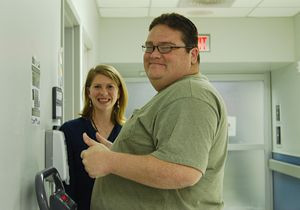Framing Incentives: High Premiums For Overweight Or Low Premiums For Healthy-Weight?

As insurance companies battle rising health care costs and prepare for the final stages of President Obama's Affordable Care Act, they are getting increasingly creative at trying to keep costs down. One such way is by offering premium incentives for healthier living. A new study, however, has found that insurance companies should tread lightly in terms of the way they approach these incentives, because depending on how you frame them, you could make overweight people feel punished.
Researchers found that policies with higher premiums for overweight people were more likely be seen as stigmatizing and punishing, while premium reductions for healthy people weren't.
"Two frames that are logically equivalent can communicate qualitatively different messages," David Tannenbaum, of the Anderson School of Management at the University of California, Las Angeles, said in a press release.
To see how this could happen, Tannenbaum set up two experiments. In the first one, 126 participants read about a fictional company that was having problems with its employees' health-care policy. In order to lower health care costs, which were going up because of an increase in overweight employees, they were going to begin offering one of four new policies.
A "carrot" plan would offer a $500 premium reduction would be given to healthy-weight employees, while a "stick" plan, increased premiums for overweight employees by $500 — both plans were exactly the same, just framed in different ways. All healthy-weight employees would pay $2,000 a year in premiums and all overweight employees would pay $2,500. The third and fourth plans were also "stick" plans, but the overweight people would pay $2,400 in premiums instead.
Tannenbaum found that most participants saw the "stick" plans as punishment for being overweight and therefore, were less likely to support them. They were also less likely to support the "stick" plans regardless of which one was cheaper, basing their stance purely on moral grounds. People with higher body mass index (BMI) scores also said that they would feel dissatisfied with their employer if these policies were real.
Going a step further, Tannenbaum had the participants decide for themselves which plan they would use in order to see if they reflected underlying attitudes. He found that participants who showed bias toward overweight people were likely to choose the "stick" plans, however, their reasons were completely different, depending on how honest they wanted to be about their bias.
"Participants who explicitly disliked overweight people were forthcoming about their decision, admitting that they chose the 'stick' policy on the basis of personal attitudes," Tannenbaum said. "Participants who implicitly disliked overweight people, in contrast, justified their decisions based on the most economical course of action."
Tannenbaum points out that the implicit justifications were just excuses, because of the participants were really concerned about costs, they would have chosen the "carrots" policy, since it forces the overweight people to pay the extra $100 and eliminates any plans where premiums were $2,400.
Although these scenarios were based in an office, Tannenbaum believes they can be applied in the real-world too.
"In a broad sense, our research affects policymakers at large," he said. "Logically equivalent policies at various domains — such as setting a default option for organ donation or retirement savings — can communicate very different messages and understanding the nature of these messages could help policymakers craft more effective policy."
However, one health insurance company has already tried incentives. In 2010, Blue Care Network told its customers they would have the choice between paying 20 percent higher premiums and walking 5,000 steps a day — with a pedometer to track their walking — for a year. Of the 15,397 people eligible to participate in the exercise, 6,548 agreed to do it, and by the end of one year, only three percent had failed to meet the requirements.
"Our evaluation of Blue Care's incentivized program showed a surprisingly high rate of people who enrolled in the Internet-mediated walking program and stuck with it — even among those who were initially hostile to the idea," senior author Caroline R. Richardson, assistant professor at the University of Michigan, Department of Family Medicine, said in a statement. "Wellness interventions like this clearly hold significant promise for encouraging physical activity among adults who are obese."
Source:
Tannenbaum D, Valasek C, Knowles E, et al. Incentivizing Wellness in the Workplace: Sticks (Not Carrots) Send Stigmatizing Signals. Psychological Science. 2013.
Zulman D, Damschroder L, Smith R, et al. Implementation and evaluation of an incentivized Internet-mediated walking program for obese adults. Translational Behavioral Medicine. 2013.
Published by Medicaldaily.com



























